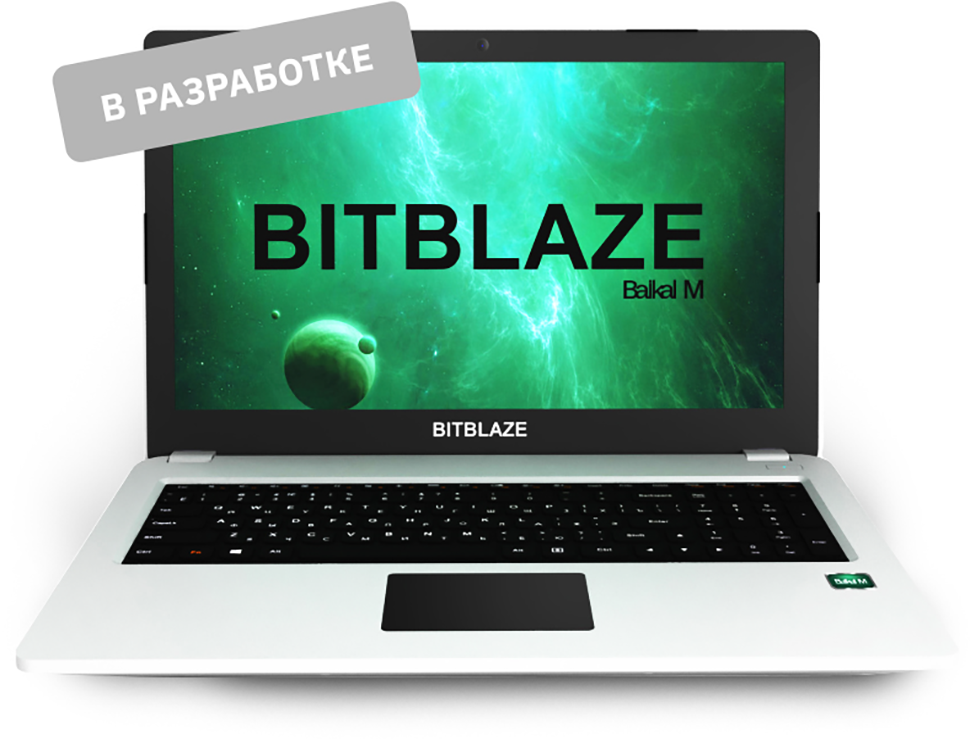Russian-Made Baikal M1-Based Laptop Shows Up in Pre-Production
BitBlaze says the final version of Arm.
Bitblaze, a Russian brand specializing in servers, storage systems, and workstations, has demonstrated its pre-production Bitblaze Titan BM15 laptop based around the Baikal-M1 processor designed in Russia. The notebook, designed primarily for government agencies and enthusiasts, is said to enter mass production in November. The only question is whether the company can indeed mass produce the machine now that TSMC does not produce advanced chips for any company in Russia.
"I have a legend in my hands: a pre-production Bitblaze Titan laptop based on the Baikal-M processor is ready," said Yana Brush, commercial director of Prombit, the company behind Bitblaze, in a blog post. "A very decent built quality, thin aluminum case, light weight. I have tested some mainstream software applications: office programs and YouTube. Works great, lasts five hours on the battery. We continue testing in various workloads, getting ready for the official release."
The Bitblaze Titan BM15 is a 15.6-inch laptop powered by Baikal Electronics' Baikal-M1 (BE-M1000) system-on-chip equipped with 16GB of DDR4 memory (up to 128GB is supported) as well as a 250GB – 512GB solid-state drive in an M.2 form-factor. The machine has almost everything that one expects from an entry-level laptop, including a Wi-Fi + Bluetooth adapter, a GbE, one USB 3.0 Type-C connector, four USB Type-A ports, an HDMI display output, and a 3.5-mm audio connector.
The Bitblaze BM15 laptop comes in an aluminum chassis, but the exact dimensions and weight are unknown. As of late March 2022, the expected weight was in the 2.2 kilograms (4.85 pounds) ballpark (according to a 3DNews report), but since the bill-of-materials was not finalized at the time, the final weight may be different.
The machine depicted on the company's website (which resembles Apple's MacBook Pro 13) vastly differs from the pre-production version that Yana Brush holds in her hands in the picture. The pre-production model resembles cheap 15.6-inch mobile PCs that go for $399~$499 at BestBuy. On the other hand, in some cases, pre-production units do not feature the final design as they are for software compatibility tests. Keeping in mind that the company does not disclose which Linux distributions the machine will run, it should be testing various software.
Despite its 'Titan' name, the BM15 is far from offering the performance you expect from a notebook with such a name. The heart of the Titan is the Baikal-M1 SoC, which uses eight outdated Arm Cortex-A57 cores operating at 1.50 GHz and outfitted with an 8MB L3 cache accompanied by an eight-cluster Arm Mali-T628 GPU with two display pipelines. The Cortex-A57 first appeared in a commercial product in 2015, whereas the Mali-T628 (Midgard 2nd Gen) has been around since 2014. The Baikal-M1 is made by TSMC using one of its 28nm-class nodes. Still, since TSMC no longer produces chips for Russian companies, we can only wonder whether Baikal Electronics has pre-purchased enough SoCs to support commercial launches of the Bitblaze Titan and other products.
Another aspect of the Bitblaze Titan notebook is the price. This March, the company expected the aluminum version of the product to cost 100,000 – 120,000 rubles ($1375 – $1650 without VAT), but the BOM was not finalized, so the final price may be different. That is a lot for an office machine but may not be important for a collectible item with a very rare SoC.
Get Tom's Hardware's best news and in-depth reviews, straight to your inbox.
"There is a chance to buy one of the pre-production samples, that is expensive," said Brush. "Or rather wait for [mass produced units], which will be released no earlier than November. We accept pre-orders."

Anton Shilov is a contributing writer at Tom’s Hardware. Over the past couple of decades, he has covered everything from CPUs and GPUs to supercomputers and from modern process technologies and latest fab tools to high-tech industry trends.
-
bit_user Thanks for covering. It's often interesting (for one reason or another) to hear about developments in Russia's tech sector.Reply -
SYNERDATA If I remember correctly, sanctions only restricted chips up to a certain node size, and I think 28nm is beyond the limit of sanctions, and so they can probably get their chips from TSMC while sanctions only restrict chips with smaller transistors, though this needs to be verified. Thanks Anton.Reply -
Alex/AT Low-end outdated phone SoC without decent software support for $1000-1500 (best case, we can expect higher). That's soviet union for you.Reply -
peachpuff Reply
Just buy it comrade...Alex/AT said:Low-end outdated phone SoC without decent software support for $1000-1500 (best case, we can expect higher). That's soviet union for you.
